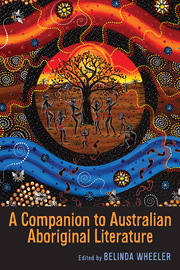Book contents
- Frontmatter
- Contents
- Foreword
- Acknowledgments
- Chronology
- Introduction: The Emerging Canon
- 1 Indigenous Life Writing: Rethinking Poetics and Practice
- 2 Australian Aboriginal Life Writers and Their Editors: Cross-Cultural Collaboration, Authorial Intention, and the Impact of Editorial Choices
- 3 Contemporary Life Writing: Inscribing Double Voice in Intergenerational Collaborative Life-Writing Projects
- 4 European Translations of Australian Aboriginal Texts
- 5 Tracing a Trajectory from Songpoetry to Contemporary Aboriginal Poetry
- 6 Rites/Rights/Writes of Passage: Identity Construction in Australian Aboriginal Young Adult Fiction
- 7 Humor in Contemporary Aboriginal Adult Fiction
- 8 White Shadows: The Gothic Tradition in Australian Aboriginal Literature
- 9 Bold, Black, and Brilliant: Aboriginal Australian Drama
- 10 The “Stolen Generations” in Feature Film: The Approach of Aboriginal Director Rachel Perkins and Others
- 11 A History of Popular Indigenous Music
- Notes on the Contributors
- Index
4 - European Translations of Australian Aboriginal Texts
Published online by Cambridge University Press: 05 September 2013
- Frontmatter
- Contents
- Foreword
- Acknowledgments
- Chronology
- Introduction: The Emerging Canon
- 1 Indigenous Life Writing: Rethinking Poetics and Practice
- 2 Australian Aboriginal Life Writers and Their Editors: Cross-Cultural Collaboration, Authorial Intention, and the Impact of Editorial Choices
- 3 Contemporary Life Writing: Inscribing Double Voice in Intergenerational Collaborative Life-Writing Projects
- 4 European Translations of Australian Aboriginal Texts
- 5 Tracing a Trajectory from Songpoetry to Contemporary Aboriginal Poetry
- 6 Rites/Rights/Writes of Passage: Identity Construction in Australian Aboriginal Young Adult Fiction
- 7 Humor in Contemporary Aboriginal Adult Fiction
- 8 White Shadows: The Gothic Tradition in Australian Aboriginal Literature
- 9 Bold, Black, and Brilliant: Aboriginal Australian Drama
- 10 The “Stolen Generations” in Feature Film: The Approach of Aboriginal Director Rachel Perkins and Others
- 11 A History of Popular Indigenous Music
- Notes on the Contributors
- Index
Summary
Since the late 1970s, books authored or coauthored by Australian Aboriginals have been translated into well over seventeen different languages, with continental Europe being the most prolific and largest market for this literature in translation (Haag, “Indigenous Australian,” 2). Translations of Aboriginal literature into European languages are a comparatively recent phenomenon—the first translated book authored by an Aboriginal to be sold in Europe was the Polish edition of Kath Walker's Stradbroke Dreamtime in 1977. As statistical evaluations of bibliographies have shown, translation of Aboriginal literature has increased since the 1988 Australian bicentennial, with roughly ninety translations published so far.
Though the number of translated works written by Australian Aboriginals reflects the increasing interest in their culture, the way these books are translated and marketed often distorts the author's original intentions and distorts how Australian Aboriginals are perceived by many European communities. For example, many books authored by Europeans about Aboriginal cultures are often still deceivingly advertised as “Aboriginal” literature. There is also the tendency in Europe to perceive the translations in terms of their cultural value, rather than their literary significance (Haag, “Indigenous Literature,” 52). Finally, the European reception of Aboriginal literature often reflects the European audiences' idealized, exotic views of Aboriginal Australians, which is connected with the marketing of this literature in Europe, consequently rein-forcing outdated stereotypes.
- Type
- Chapter
- Information
- A Companion to Australian Aboriginal Literature , pp. 71 - 88Publisher: Boydell & BrewerPrint publication year: 2013



